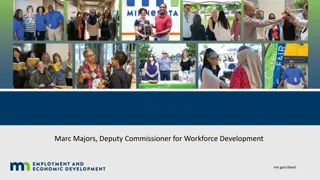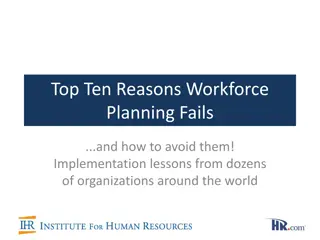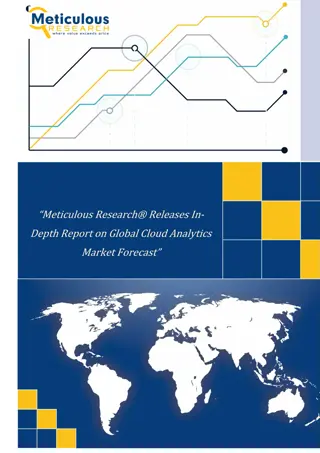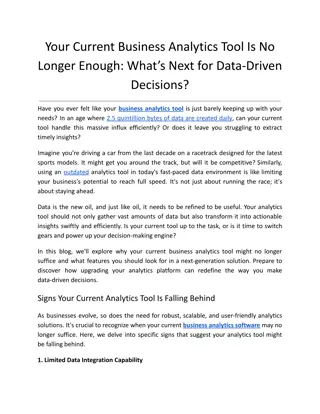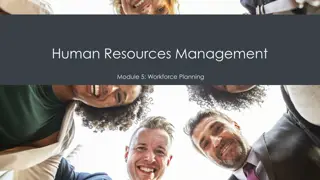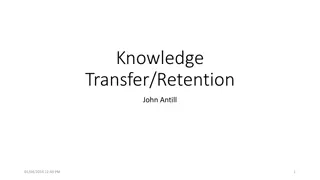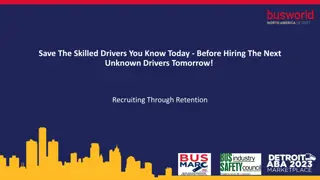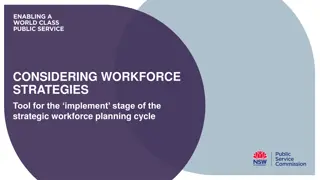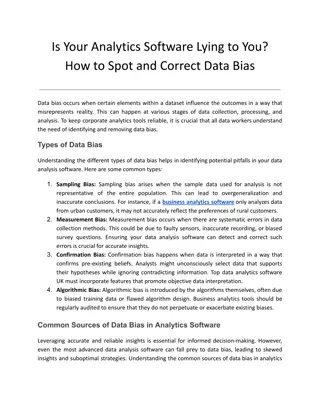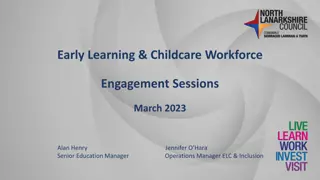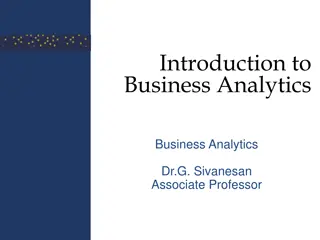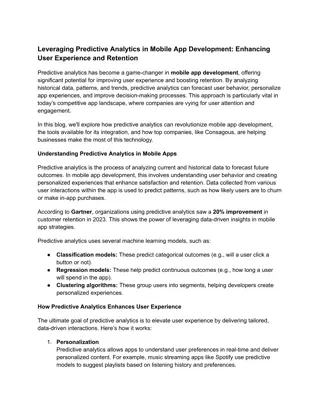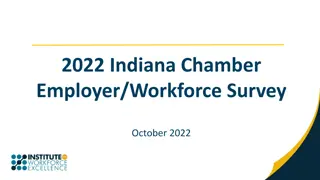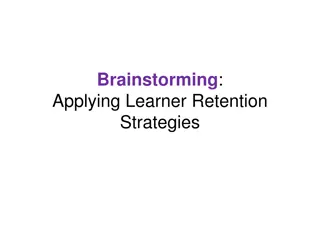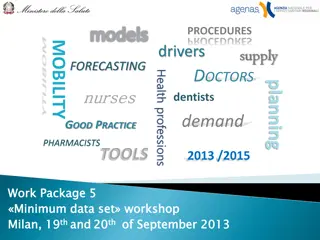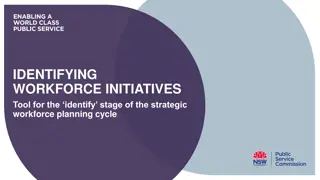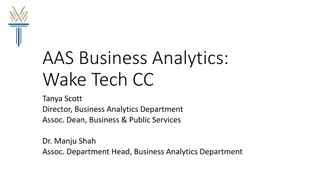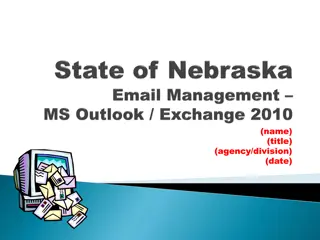Effective Knowledge Retention Strategies in Workforce Planning and Analytics
Retaining knowledge is crucial for organizations to enhance customer service, foster innovation, improve efficiency, and bridge skill gaps. This article explores the significance of knowledge retention, the types of knowledge essential for succession planning, and two effective strategies - the Knowledge Retention Process (KRP) and After-Action Reviews. By implementing these strategies, teams can efficiently capture and share tacit knowledge, facilitating continuous learning and collaboration.
Download Presentation

Please find below an Image/Link to download the presentation.
The content on the website is provided AS IS for your information and personal use only. It may not be sold, licensed, or shared on other websites without obtaining consent from the author. Download presentation by click this link. If you encounter any issues during the download, it is possible that the publisher has removed the file from their server.
E N D
Presentation Transcript
Knowledge Retention Techniques and Resources Workforce Planning and Analytics Section (WPAS), WSDD, OHR
Why Does Retaining Knowledge Matter? Benefits Risks Improved customer service. Innovative ideas come from sharing knowledge across people and teams. Improved efficiency. Knowledge loss due to turnover or retirements. Lost networks when people leave. Inefficiencies getting things done. Skill gaps. 2
Knowledge Types There are 3 types of knowledge employees use that is important to capture when succession planning. Tacit knowledge can be the most challenging to capture with tradition written methods. Tacit Explicit Knowledge Implicit Knowledge Tacit Knowledge Knowledge Here is the cake recipe focused on documenting. Experiences & wisdom that contribute to knowing how something is done well. Shared understandings. Written knowledge, My oven takes longer to warm up when baking so I ll start it sooner Everyone likes cake on their birthday Here is the cake recipe 3
Knowledge Retention Strategy #1: The Knowledge Retention Process (KRP) The Knowledge Retention Process outlined below is a group exercise that helps a team share tacit knowledge broadly with each other. 1 2 3 4 Practice & innovate Share & capture knowledge Create a plan Establish a team The team can practice what they learned together or separately. They may also want to discuss how to innovate around each question. Have the team meet (without the expert) & create a list of questions/topics they d like to learn about from the expert. (Focus on gathering knowledge unique to the expert that can t be explained easily via email). Schedule meetings for the team to ask the expert questions and share knowledge with the team. Identify junior, journey & senior level team members who would like to learn more about the expert s role before they depart. Present the learning plan to the expert, give them the opportunity to add any topic areas they would like. 4
Knowledge Retention Strategy #2: After Action Reviews After-action review meetings helps teams to share knowledge through innovative collaboration. For a more in-depth guide on how to conduct an after-action review, see the USAID After Action Review Guidance. What did you intend? What happened? 1 What should we do next time? What can we learn about it? 2 3 4 Focus on the facts of the event such as cost, number of people involved in the event, and opinions. Get many perspectives, there is no one best version. What was the objective? What was the key assignment? Why did events occur the way they did? What did we do well that we need to share so it is not forgotten? What lessons can we learn from our mistakes? What questions do we still have about what happened and why? What worked that we want to repeat? What worked that may not work again? What should we do differently? 5
Additional Strategies to Share Knowledge The following learning and development opportunities can help employees prepare to fill more senior roles, should the need arise. Click on the hyperlinks to find more resources for each category. See slides 9 & 20 for more information on each opportunity. Shadow/ Rotational Interviews Transition planning Interviews Knowledge sharing Caf Acting Mentorship Opportunities Details/ Short assignments Team Project Solving Sessions Master Class/ Expert Seminar Knowledge Retention Exercise Cross-org projects Lunch & Learn After Action Review Exercises Formal Training Knowledge Mgmt Plans Conferences & Seminars Communities of Practice Wikithon 6
Sample Questions to Capture Tacit Knowledge Below are some general examples of questions that capture tacit knowledge. You can leverage these questions during transition interviews or knowledge transfer exercises. What are your top 3 most memorable moments? What did you learn from them? What excites you most about your role? What frustrates/irritates you most about this role? What might help reduce the irritation? 1 7 When you think of your go to people (other experts), what do they have in common? How did they learn? What makes them each unique? How do you describe your role? What uniqueness do you bring to the role? 2 8 If you were to hire someone to do this role, what questions would you ask them? What would you be looking for? If there were 1-3 things you needed to demonstrate for me (as opposed to discuss with me), what would they be? 9 3 What are the biggest challenges/problems with our documentation/processes related to your role? What have you done to improve the previous challenges? How did you know to do that? How would you characterize the kinds of relationships you have and need to be the most effective in this role? 10 4 What is the most frequently question asked of you? How do you answer? What would need to change for the question to not be asked anymore? 11 5 What s been your most impactful training over the years? If budget were unlimited, what would you do first? Is there something you ve always wanted to try and improve, but didn t have the time or money? 6 What have been some recent out of the ordinary challenges? How did you address them? 12 7
The NIH Workforce Planning Toolkit NIH Employees can leverage the Workforce Planning Toolkit for a variety of workforce development projects, including succession planning. Enter the Workforce Planning Toolkit: https://hr.nih.gov/workforce/w orkforce-planning
Additional Information on Knowledge Sharing Strategies Acting Opportunities Opportunities to fill the role for more senior positions while they are away from the office. After Action Reviews A structured debrief meeting that helps teams understand what happened during a project or event, why it happened, and what can be improved. For more information see the USAID guide: \\ODHSRV02.nih.gov\HOME5$\blaubc\Research and Training Materials\Knowledge Transfer Training\After Action Review USAID.pdf Communities of Practice A group of people who share a common interest in a topic and work together to improve their knowledge and skill. Some of NIH s communities can be found through the NIH Admin Hub: https://adminhub.nih.gov/ Conferences & Seminars Formal organized meetings to share knowledge and new developments in a certain subject area. Cross-organizational Projects A project organized with team members across an organization, IC, or Division, wherein team members have the opportunity to work with others outside their normal duties and scope. Details/Short-term Assignments A special assignment or duty wherein an employee works for a different organization for an agreed upon length of time to gain new experience in a different role. NIH detail opportunities can be found here: https://ohr.od.nih.gov/iob/SitePages/Home.aspx Brown Bag Sessions or Lunch & Learns Informal meetings where employees can share something they ve learned with colleagues. Master Class A class given by an expert to students in a particular discipline wherein the expert gives extensive instruction, knowledge and advice on the subject. Organizations can organize a master class for junior to mid level employees to learn from more experienced coworkers. 9
Additional Information on Knowledge Sharing Strategies Mentorship When a more experienced employee provides another employee with advice, guidance, and support to help them grow their career. For more information see the NIH mentoring website: https://hr.nih.gov/working-nih/mentoring/nih-mentoring-program Transition Planning Interviews These are conducted https://hr.nih.gov/sites/default/files/public/documents/2020-05/14-stafftransitionplantemplate-508.docx Formal Training Training that has a structured curriculum. Knowledge Retention Exercise A group of junior to professional level employees develops a list of questions they want to know from an expert and interviews the expert over a period of weeks or months to learn more about their expertise. See Knowledge Retention Strategy #1. Job Shadowing When an employee follows another employee to observe their work and learn more about a job they haven t experienced. Transition Planning Interviews Interviews conducted with employees to capture information on their work portfolio, network, experiences, and special skills before their temporary or permanent departure. To see the NIH Transition Interview Guide: https://hr.nih.gov/sites/default/files/public/documents/2020-05/14- stafftransitionplantemplate-508.docx Wikithon A special event wherein employees, content owners, and communities of practice collaborate to create and edit Wikipedia content for the benefit of the organization. 10





